unit 5 情态动词
仁爱英语七年级下册Unit 5 知识点
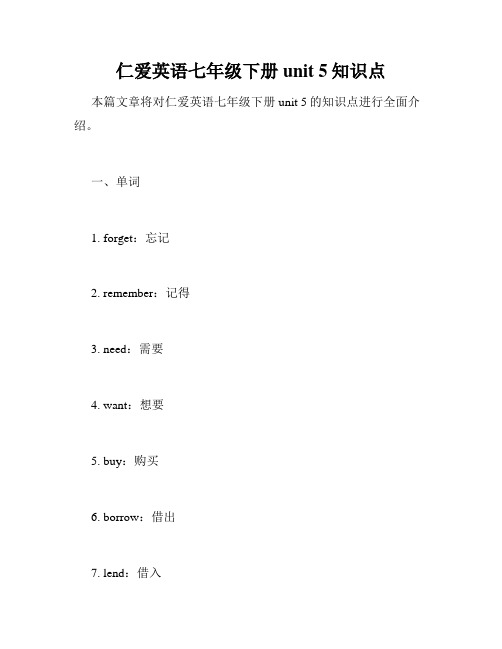
仁爱英语七年级下册unit 5知识点本篇文章将对仁爱英语七年级下册unit 5的知识点进行全面介绍。
一、单词1. forget:忘记2. remember:记得3. need:需要4. want:想要5. buy:购买6. borrow:借出7. lend:借入8. pay:支付9. cost:花费10. heavy:重的11. light:轻的12. thin:薄的13. thick:厚的14. long:长的15. short:短的16. small:小的17. big:大的18. hot:热的19. cold:冷的二、语法1. 情态动词情态动词包括can/could, may/might, must, should/ought to等,用于表示说话人的态度、意愿、可能性、推测等。
比如:I can swim.(我会游泳。
)You must finish your homework.(你必须完成作业。
)2. 定冠词和不定冠词定冠词the用于特指某一事物,比如the book(那本书);不定冠词a/an用于泛指某一个,比如an apple(一个苹果)。
3. 物主代词我、你、他、她、它等人称代词后面加上我的、你的、他的、她的、它的等词,就构成了物主代词。
比如:I lost my bag.(我丢了我的书包。
)4. 名词的复数在名词后面加-s或-es来表示复数形式,比如books(书)、boxes(箱子)。
5. 副词副词是用来修饰动词、形容词、副词和句子的。
常用的副词有often, always, sometimes等。
6. 数词数词是用来表示数目、数量的词语。
基数词表示数量,比如one(1)、two(2)等;序数词表示顺序,比如first(第一)、second(第二)等。
三、阅读理解这个单元包含了一篇短文,提供了购物建议。
阅读理解是考查学生字义理解能力的一种方式,要求同学们读懂短文,并理解其内容。
四、写作技能写作技能涉及到学生组织语言,进行人际交流的能力。
Unit5SectionⅢGrammar——情态动词和过去将来时
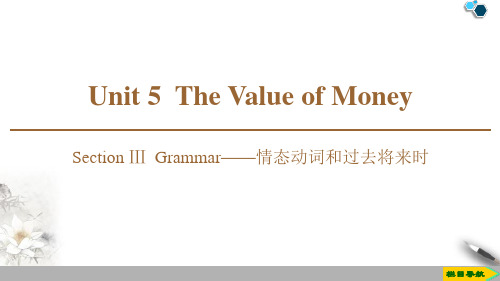
英语课件
栏栏目目导导航航
(1)①can 表示可能性时,指的是理论上的可能,它通常不用来表 示某事实际发生的可能性或真实性。如:
Accidents can happen.Anybody can make mistakes. 如果我们要表达某事发生的实际可能性,要用 may,could 或 might 等。
You should have told her about it the day before yesterday. It's wonderful that you should have achieved so much in these years. “情态动词+have+过去分词”是很重要的一种句型,除 should 外,may,might,must,couldn't,needn't,ought to 等都可以用于这 一句型,但要注意使用不同的情态动词句子的意思就有所不同。
英语课件
栏栏目目导导航航
(6)should 除表示必要或义务外,还可表示推测或可能。如: The American friends should be here now. “should/ought to+have+过去分词”既可表示本该做而事实上 没有做的事,也可以表示惊讶、责备、赞叹等情绪。如:
英语课件
栏栏目目导导航航
(7)ought to 与 should 意思接近,大多数情况下二者可以互换,但 是 should 谈的是自己的主观看法,ought to 则更多反映客观情况,在 谈到法律、义务和规定时使用。如:
We should/ought to help each other and learn from each other in our work.
人教版(2019)必修第三册Unit5The Value of Money情态动词课件(

推测
Hurry up! The guests should/ought to be here by now.
Sally was upset that we didn’t tell her the news. You
should have told her about the truth.
责备,本该做但事实 上没做
Try your best, and your wish will come true. 将来一定/准会…
Future in the past: would
Past prediction
The weather forecast said it would rain, so I took my umbrella.
#Ability: can vs. be able to be able to do强调需要某种条件或努力做成某事: It was a holiday and the children were able to go to
the sea side. The girl worked hard so she was able to pass the
情态动词
Grammar
Form Function Meaning
Page 54 Func必tio要n,s需&要Meaning义s务,职责
Example
Necessity Possibility Obligation Request Advice Intention
We can discuss it now.
Won’t, can’t, doesn’t
The window won’t open. 这扇窗户怎么都打不开(强调主观意愿,实施者执 意要打开)
Unit 5 Fun Clubs 单元语法:情态动词 can、play+乐器七年级英语上册(人教版)

人教版初中英语语法专项过关(七年级上册-Unit5 Fun Club)选词填空1.—Do you have ________ guitar, Tom?—Yes, and I can play ________ guitar too.A./; the B.the; a C.a; /D.a; the 2.--Can Tim play 1 football?—Yes. And he can play piano too.A.the;the B.the;不填C.不填;the D.不填;不填3.—________ your sister play volleyball, Jim?—________. But she can play basketball.A.Can; No B.Does; Yes C.Can; Yes D.Will; No 4.—Can she go out on school nights?—No, she ________. And I can’t, either.A.doesn’t B.don’t C.can’t D.isn’t 5.—Do you play ________ piano in your free time?—No. I like sport, so I often play ________basketball with my friends.A./; the B.the; /C.the; the D.a; a 6.—What can Jane do?—She can play chess and also violin.A.the; the B.the; a C./; the D.the; / 7.“Can you see my ruler?” “Sorry, ________.”A.I don’t B.I’m not C.I can’t D.I can 8.Let’s play ________ chess. I don’t want to play ________ violin.A.the, /B./, the C.the, the9.Peter can play ________violin,but he can't play ________ chess.A.the,/B./,the C.the,the D.a,the 10.—Does Li Lei like playing ________ guitar?—No. He likes playing ________ soccer.A.the; the B./; the C.the; /11.— Could you clean your room?—________A.No, I couldn’t B.No, you can’t C.Yes, I could D.Yes, I can 12.The women are playing _______ basketball and girls are playing _______ flute.A.the; the B./; the C.the; /13.Kitty likes to play ________ piano.A.a B.an C.the D./14.I play ________ guitar in my spare time. It makes my life more colorful.A.a B.an C.the D./ 15.—What are you doing, Ding Tao?—I’m reading ________ article about how to play ________ piano well.A.a; the B.an; the C.a; /D.an; / 16.I usually play ________ violin to relax in my free time.A.a B.an C.the17.Linda likes playing ______ sports, but she dislikes playing ______ guitar.A.the; /B.the; the C./; the D./; a 18.Lucy can play ________ basketball, but she can’t play________ piano.A.a; /B.the; /C./; the D.the; a 19. — Can you play _________ piano?— No, I can’t. But I can play _________ basketball.A.the; the B.the; a C.the; /D.a; the 20.Tina’s cousin is _______ violinist. He can play _______ violin very well.A.an, \B.a, the C.the, the D.\, a 21.Mike can play_____violin, but he can’t play_____volleyball.A.the, the B.the,/C./,the D./,/ 22.-I think Langlang is__________excellent musician-Yes, he can play__________piano very well.A.a; the B.an;/C.an;the D.a;/ 23. Lucy is ________ university student. She likes playing _______ piano.A.a; /B.a; the C.an; the D.an; /24.I can play ________ drums but I can’t dance well.A./B.a C.an D.the 25.—________ he swim?—Yes, he swims like a fish.A.Can B.May C.Must D.Will 26.—Can you play with a yo-yo, Jim?—Yes, I ________. It’s easy.A.must B.can C.am D.may 27.—It’s such a long way!—Don’t worry. You ________ share a ride with us.A.should B.can C.must D.have to 28.Lucy is good at basketball. She ________ play basketball very well.A.can B.can’t C.must D.have to 29.Tony is from England. He _________ speak Chinese.A.must not B.can not C.may not D.should not 30.— Can you find Black Hill on the map, Cindy?— ________. It’s here!A.Yes, I must B.Yes, I can C.No, I needn’t D.No, I don’t 31.—________ you ride a bike?—Yes, I can.A.May B.Can C.Must D.Should 32.— ________ you ride a bike?— Of course, I can. My father taught me when I was 8.A.Can B.Need C.Will D.Must 33.Trees are called natural air conditioners. They ________ cool the air.A.must B.can C.may D.need 34.—Can he sing English songs?—Yes, ________. And he is going to sing one at the party.A.he does B.he has C.he can 35.—What ________ I do for you?— I’d like a cup of tea.A.will B.can C.do D.could 36.—Can you ride a horse?—No, I _______.A.needn’t B.may not C.can’t D.mustn’t 37.—How amazing this robot is!—Wow, it has video cameras in its eyes, so it ________ “see” and communicate with pepple.A.may B.can C.must D.should 38.—________ you dance now, Judy?—Yes, I can. But I ________dance two years ago.A.Can, can’t B.Can, couldn’tC.Could, can’t D.Could, couldn’t39.My classmate is jumping so far! I ________ believe my eyes.A.can’t B.mustn’t C.needn’t D.shouldn’t 40.—Uncle Wang, my father is on business. He ________ come to the party this evening.—Never mind.A.needn’t B.can’t C.shouldn’t D.mustn’t 41.—Carl, ________ you play the piano?—No, I can’t. But I am learning how to play it.A.can B.must C.should D.need42.Jane ________ perform ballet at all when she was a little girl, but she ________ do it now.A.could; can B.couldn’t; can C.could; can’t D.couldn’t; can’t 43.—Can Jenny and Jane swim?— ________.A.Yes, they do B.Yes, they are C.Yes, she can D.No, they can’t 44.—Can you play the guitar, John?—Yes, I can. But I ________ sing ________ dance.A.can’t; or B.can; and C.can; or45.—Can your sister sing?—________.A.Yes, he can B.Yes, he does C.No, she doesn’t D.Yes, she can 46.You ________ watch TV, but you have to clean the room first.A.must B.can C.can’t 47.—Does your sister like ________?—Yes, she does. But she ________ swim very well.A.swimming; can B.swim; can C.swimming; can’t D.swim; can 48.—Emma, can you sing an English song?—Yes, I ________.A.can B.must C.need D.may 49.—Can you finish the task tonight?—Sorry, I________. I have too much homework to do.A.needn’t B.can’t C.mustn’t D.shouldn’t 50.—________ you play _________ basketball?—No, I can’t.A.Do; the B.Can; the C.Can; /D.Are; /参考答案:1.D【详解】句意:——汤姆,你有吉他吗? ——是的,我也会弹吉他。
人教版九年级英语unit5语法知识点
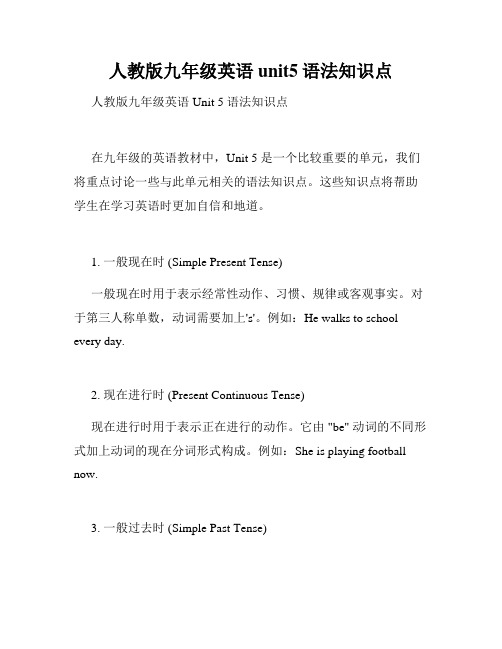
人教版九年级英语unit5语法知识点人教版九年级英语Unit 5 语法知识点在九年级的英语教材中,Unit 5 是一个比较重要的单元,我们将重点讨论一些与此单元相关的语法知识点。
这些知识点将帮助学生在学习英语时更加自信和地道。
1. 一般现在时 (Simple Present Tense)一般现在时用于表示经常性动作、习惯、规律或客观事实。
对于第三人称单数,动词需要加上's'。
例如:He walks to school every day.2. 现在进行时 (Present Continuous Tense)现在进行时用于表示正在进行的动作。
它由 "be" 动词的不同形式加上动词的现在分词形式构成。
例如:She is playing football now.3. 一般过去时 (Simple Past Tense)一般过去时用于表示过去某个特定的时间发生的动作或状态。
动词需要用过去式。
例如:I watched a movie last night.4. 过去进行时 (Past Continuous Tense)过去进行时表示过去某一时刻正在进行的动作或状态。
它由"was/were" 动词的不同形式加上动词的现在分词形式构成。
例如:They were studying when I called.5. 一般将来时 (Simple Future Tense)一般将来时用于表示将来某个时间将要发生的动作或状态。
通常使用 "will" 或 "be going to" 加上动词原形来构成。
例如:Wewill have a meeting next week.6. 现在完成时 (Present Perfect Tense)现在完成时用于表示过去某个时间开始并一直延续到现在的动作或状态。
它由"have/has" 加上动词的过去分词形式构成。
八年级unit5情态动词can的用法

语法:情态动词can的用法武汉艺术生文化课培训:The more you know, the less you fear.你知道的越多,害怕的越少。
(知识压倒恐惧)一、词语检测1.Today I'm very busy, but she is ____________(空闲的).2.I get his ____________ (邀请)but I can't go.3.I have too _________(多) homework to do.4. Marie is going fishing with grandpa the w_____ day.5. I think I’m free t____________ 22:00 today.二、短语互译1. 参加某人的聚会___________2. 在星期六的下午________________3. 我非常乐意_________________________4. 去看医生__________________5. 看望某人的姑姑_____________6. 找到,弄清楚,查明_________________________7. go to the mall______________8. look for_________________9. too much homework_________________________三、根据提示完成句子1. 你能帮我照看一下我的女儿吗?_________________2. 在星期四,我必须准备化学考试。
___________________________3. 假期过完请给我打电话。
________________________4. 我的美国朋友明天将来看望我。
________________________5. 请保持安静!我正在努力学习。
______________________一、单项选择1. What are you doing ______ Monday morning? A. on B at C. in D. from2. Thanks for ______ me to the party. A. ask B. asking C. asks D. to ask3. Bob can't come out to play because he ______ help Dad in the garden. A. can B. can't C. has toD. has4. —Would you like a cup of coffee? —______.A. No, I don't wantB. No, thank youC. I don't like itD. Yes, I’d like to5. —My mother is ill. I have to take care of her at home.—______.A. Thank youB. Oh, I don't knowC. I'm sorry to hear thatD. Really二、用单词的适当形式填空1. We are ____________ (babysit) the little boy now.2. I’d like ____________ (come) to you birthday party.3. Thanks very much for____________ (give) me the chance.4. Can he ____________ (drive) the car alone now?5. —What is Helen doing? —I don’t know. Maybe she ____________ (study) for her math test.6. The story he is telling is ________ (real) funny.7. He came into my room _______ (quiet).8. We go to school after _____ (have) breakfast. 9. Don’t you think we need ______ (buy) a new car.10. I’m very sorry ____________ (trouble) you.三、完成句子1. 我们每天花三个小时看电视。
新译林版英语八年级上册Unit5语法情态动词专练含答案

8AUnit5Grammar(1) 情态动词专练一.情态动词can could 能; 可以;可能can’t couldn’t 不能,不可以;不可能may might 可以;可能,也许may not 不可以must 必须(主观);一定(must be);mustn’t 不可以,不准,千万不要(表禁止)have to 必须,不得不(客观)don’t have to 不必要need 需要needn’t 不必要should 应该shouldn’t 不应该注:needn’t do=don’t need to do=don’t have to do 不必要做某事一.用以上情态动词填空:1.Can you ride a bike? Yes, I_____./ No, I________2.Could you ride a bike at the age of six? Yes, I _______/ No, I __________3.Could I use your ruler? Yes, of course you_______./ sorry, you_____. I’m using it now.4.May I ask you some question? Yes, you______./ No, you_________/__________.5.Must I clean the classroom now? Yes, you________./No, you________/_______6.He ______come here tonight, but I’m not sure about it.7.There will be no class tomorrow. You ________ come to school.8.You________be tired and thirsty after walking such a long way on such a hot day.9.It’s raining heavily outside. Jim _________stay at home, or he’ll have a cold again.10.He___________stay at home yesterday because his mother was ill.11.As a Chinese, you__________ _try your best to work for your country,12.I can’t start my car now. Something _______be wrong with it.. Will you mend it for me?13.I wish I_______fly like a bird in the future.14.You _________play with fire. It’s too dangerous.15.Amy ________be here now because she has just gone to London(她刚刚去伦敦).16.I________drive a car last year but I _______ now.17.You had better take a raincoat with you. It _______rain later on.18.A: Did you hurt yourself in the fire?B: Yes, I ________get out of the car because the door was locked.19.The desk is not clean. You ________clean it.20.A: Where’s Mr Hu ? ______ he be in the library ?B: No, he ______ be there .he is waiting for me at the school gate二.单项选择( ) 1. 1. _____ I go out to play now,Mum? No,you______ .A.May,shouldn’t B.Can,needn’tC.Must,can’t D.May.mustn’t( ) 2. -Mum,may I watch TV now?-Sure,but you _____ help me with my English.A. canB. mayC. mustD. could( ) 3. -Can you go skating with us this afternoon?-Sorry,I can't. I ________ take care of my little sister at home.A. canB. mayC. wouldD. have to( ) 4. -May I have a word with you?-No,you ________. I'm busy today.A. needn'tB. wouldn'tC. don't have toD. can't( ) 5. -________I have your English name,please?-Yes,Helen. H-E-L-E-N.A. MustB. MayC. WillD. Need( ) 6. -Who is the boy over there?Is it John?-No, it _____ be him. John is much taller.A. mustn'tB. may notC. can'tD. needn't( ) 7. She ________ know the answer,but I'm not sure.A. maybeB. may beC. mayD. must( ) 8. John________ come to see us tonight,but he isn't very sure yet.A. mayB. canC. has toD. must( ) 9. We ____ hurry if we want to arrive in time.A. mustB. needC. mayD. have to( ) 10. “ _____ I borrow your dictionary?” “ Certainly, here you are.”A. MustB. MayC. NeedD. Shall( ) 11. — ____ I take the newspaper away ? — No, you mustn't. You___ read it only here.A. Must; canB. May; canC. Need; mustD. Must; must( ) 12. —Can you speak Japanese? —No, I_______.A. mustn'tB. can'tC. needn'tD. may no( ) 13. —He_______ be in the classroom, I think.—No, he _______ be in the classroom. I saw him go home a minute ago.A. can; may notB. must; may notC. may; can'tD. may; mustn't( ) 14. He isn't at school. I think he _______ be ill.A. canB. shallC. mustD. has to( ) 15. --- Could I use your dictionary? --- Yes, you .A. willB. couldC. canD. must( ) 16. —May I put my bike here?—No, you ________. You should put it over there.A. couldn’tB. needn’tC. mustn’tD. won’t( ) 17. There will be an important test tomorrow morning. You _______ be late.A. may notB. needn’tC. mustn’tD. couldn’t( ) 18. -Must I hand in my exercise book today?-No,you ________.A. can'tB. needn'tC. mustn'tD. won't( )19.You__________to the meeting this afternoon. If you have something important to do.A.needn’t to comeB. don’t need comeC. don’t need comingD. needn’t come ( ) 20.________you show me how to use the computer?—With pleasure.A.CouldB. ShouldC.NeedD.Must( ) 21.--_______Mr Wu be at home this time?--I’m not sure. But you_______ make a call firstA. Can, canB.May, mayC. Will, canD.Shall, may( )22.—Where is Lucy?---I’m not sure.She____________in the school library.A. maybeB. must beC. may beD. will be( )23.--__________I come back before 11:00?--No,you________.But you_________be back later than lunchtime.A.Must, needn’t , can’tB. Can, can’t, mayC.Need, mustn’t, mustD.May, needn’t, can’t参考答案:一1.can,can’t2.could,couldn’t3.can,can’t4.may,mustn’t/can’t5.must, needn’t/don’t have to6.may7.needn’t8.must9.has to 10.had to 11.should 12.must 13.could 14.shouldn’t/mustn’t15.can’t 16.couldn’t, can 17.may 18.couldn’t 19.must 20.May,can’t.二.1-5DCDDB 6-10 CCAAB 11-15.BBCAC 16-23CCBDA BCA。
五年级第五单元英语重点语法

五年级第五单元英语重点语法
五年级第五单元英语重点语法主要包括以下几个方面:
1. 现在进行时:表示正在进行的动作或正在发生的事情。
基本结构是“be 动词+动词ing形式”,例如“I am playing football”。
2. 情态动词“can”:表示能力或可能性。
常用于询问或表达某人的能力或某事的可能性。
例如“Can you swim?”“Yes, I can”。
3. 表达喜好的方式:使用“like”或“love”来表达对某事物的喜好。
例如“I like ice cream”或“I love my family”。
4. 祈使句:表示请求或命令的句子。
以动词原形开头,例如“Please sit down”。
5. 描述外貌特征:使用形容词和副词来描述人的外貌特征,例如“She is tall and thin”或“He has short hair”。
以上是五年级第五单元英语重点语法,需要学生在实际应用中掌握并熟练运用。
Unit5TheValueofMoney语法填空(情态动词一般过去将来时)专项训练100题
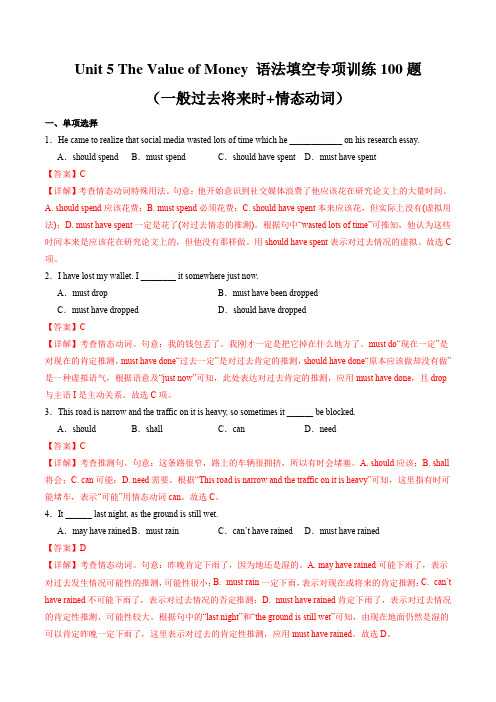
Unit 5 The Value of Money 语法填空专项训练100题(一般过去将来时+情态动词)一、单项选择1.He came to realize that social media wasted lots of time which he ____________ on his research essay.A.should spend B.must spend C.should have spent D.must have spent【答案】C【详解】考查情态动词特殊用法。
句意:他开始意识到社交媒体浪费了他应该花在研究论文上的大量时间。
A. should spend应该花费;B. must spend必须花费;C. should have spent本来应该花,但实际上没有(虚拟用法);D. must have spent一定是花了(对过去情态的推测)。
根据句中“wasted lots of time”可推知,他认为这些时间本来是应该花在研究论文上的,但他没有那样做。
用should have spent表示对过去情况的虚拟。
故选C 项。
2.I have lost my wallet. I ________ it somewhere just now.A.must drop B.must have been droppedC.must have dropped D.should have dropped【答案】C【详解】考查情态动词。
句意:我的钱包丢了。
我刚才一定是把它掉在什么地方了。
must do“现在一定”是对现在的肯定推测,must have done“过去一定”是对过去肯定的推测,should have done“原本应该做却没有做”是一种虚拟语气,根据语意及“just now”可知,此处表达对过去肯定的推测,应用must have done,且drop 与主语I是主动关系。
八年级上册英语Unit5-can-you-come-to-my-party知识点总结
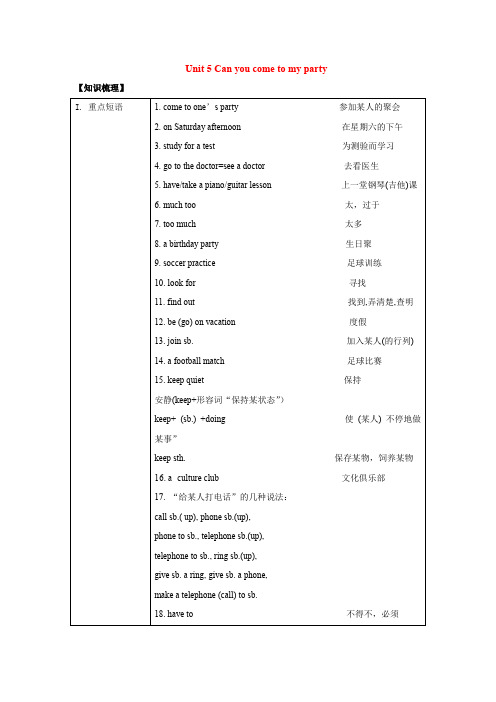
Unit 5 Can you come to my party 【知识梳理】16. aII.1.invitation m邀请,请帖invitation为名词,意为“邀请,请帖”。
其动词形式是invite,意为“邀请”。
They invited us to come and live with them.他们邀请我们来和他们同住。
The Smiths invited us to dinner.史密斯一家邀请我们去吃饭。
Thanks for your invitation!谢谢你的邀请12·Jenny,can you come to my party on Saturday afternoon?珍妮,你能来参加我星期六下午的聚会吗?这是一个婉转请求对方去做某事的句型。
情态动词call此处用来提出邀请。
Can you go shopping with me?和我一起去购物好吗?Can you go to the movies this evening?今晚去看电影好吗?[辨析] can与couldCan为情态动词,可表示邀请或请求。
用could时语气更委婉。
其肯定答语一般为Sure,I’d love to;否定答语中可用Sorry代替No,以示礼貌,即Sorry.I can't.一Can you help me with my English?你能帮我学英语吗?一Sure,I’d love to. /Sony, I can't.I'm a little ill.当然,我很乐意。
/我很抱歉,我有点病了。
3.I’d love to.我愿意。
I’d love to是I would love to的缩略形式。
常用来回答对方客气的邀请,也可以用I'd like to 来表示,意为“我很愿意”。
—Would you love to go to the movies with me? 你愿意和我一起去看电影吗?一Yes,I'd love to.是的,我很愿意。
情态动词Unit 5 Section A

C. mustn’t , can D. mustn’t , must
14.You ___ return the book now . You can keep it till next week . A. can’t B. mustn’t C. needn’t D . may not 15 . Let’s go dancing . Sorry , ____. I have to go to a meeting . A. can’t B. mustn’t C. needn’t 16 . Must I come back before 11:00 ?
must / could / might / can’t + be + n . / sb’s
must / could / might / can’t + be + doing
large ( ) 1. —Susan’s parents have bought a large house with a swimming pool. a swimming pool —It _____ be very expensive. A. must B. can C. mustn’t D. may not ( ) 2. Henry _____ be at home because he phoned me from the farm just now. at home the farm A. mustn’t B. isn’t able to C. may not D. can’t
1. Whose book is this ? It must be Lucy’s . It has her name on it . 2 . The line is busy . Someone must be using the telephone . 3 . The light is on . Mr. Green must be at home . 4 . Where’s Lucy ? I’m not sure . She might / could be in the school library . 5 . Whose pen is this ? It could / might be Tom’s . He has a blue pen . 6 . What do you think the man is running ? He could / might be running for exercise . 7 . The man can’t be Uncle Wang . He has gone to Beijing . 8 . This T-shirt can’t be John’s . It’s too small .
九年级unit5-情态动词表推测
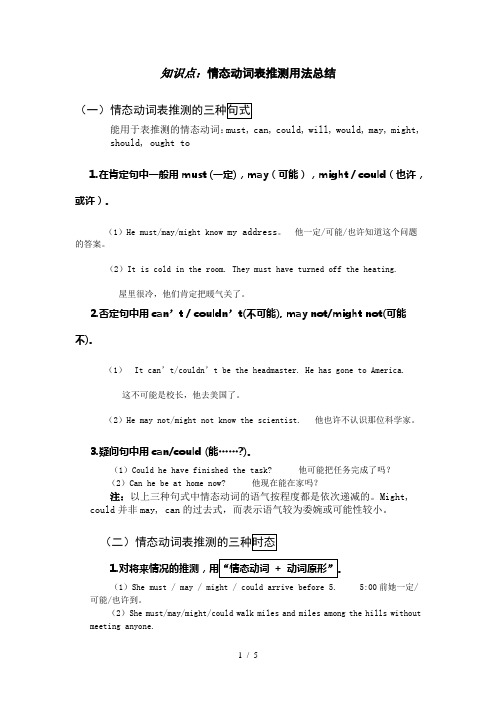
知识点:情态动词表推测用法总结能用于表推测的情态动词:must, can, could, will, would, may, might, should, ought to1.在肯定句中一般用must (一定),may(可能),might / could(也许,或许)。
(1)He must/may/might know my address。
他一定/可能/也许知道这个问题的答案。
(2)It is cold in the room. They must have turned off the heating.屋里很冷,他们肯定把暖气关了。
2.否定句中用can’t / couldn’t(不可能), may not/might not(可能不)。
(1)It can’t/couldn’t be the headmaster. He has gone to America.这不可能是校长,他去美国了。
(2)He may not/might not know the scientist. 他也许不认识那位科学家。
3.疑问句中用can/could (能……?)。
(1)Could he have finished the task? 他可能把任务完成了吗?(2)Can he be at home now? 他现在能在家吗?注:以上三种句式中情态动词的语气按程度都是依次递减的。
Might, could并非may, can的过去式,而表示语气较为委婉或可能性较小。
1.(1)She must / may / might / could arrive before 5. 5:00前她一定/可能/也许到。
(2)She must/may/might/could walk miles and miles among the hills without meeting anyone.她一定/可能/也许会在山里一连走好几英里而遇不到一个人。
牛津译林版英语7AUnit5Grammar优秀教学案例

3.小组合作增强互动:教师设计了多种小组活动,如小组讨论、角色扮演等,让学生在小组内共同探讨情态动词"can"和"may"的用法。这种合作学习方式不仅提高了学生的学习兴趣,还培养了他们的团队协作能力和沟通能力。
(五)作业小结
1.教师布置作业,要求学生运用情态动词"can"和"may"写一篇小短文,描述自己的日常生活。
2.教师提醒学生在完成作业过程中注意语法规则,确保语言表达的准确性。
3.教师鼓励学生在课后主动复习所学知识,巩固记忆,提高语言运用能力。
五、案例亮点
1.情境创设丰富多样:本节课通过多媒体展示、图片、图表等多种形式,为学生提供了丰富的语言情境,使学生在真实的语境中感知和理解情态动词"can"和"may"的用法,提高了学生的语言运用能力。
(二)问题导向
1.教师提出引导性问题,激发学生的思考和探究欲望,引导学生自主发现和总结情态动词"can"和"may"的用法。
2.通过设置阶梯式的问题,引导学生由浅入深地理解情态动词"can"和"may"的用法,培养他们的思维能力。
3.鼓励学生提出问题,充分调动他们的学习积极性,培养他们的问题意识和解决问题的能力。
3.教师进行现场示范,用"can"和"may"进行对话,让学生跟随教师一起练习,加深对这两个情态动词用法的理解。
Unit 5 动词概述
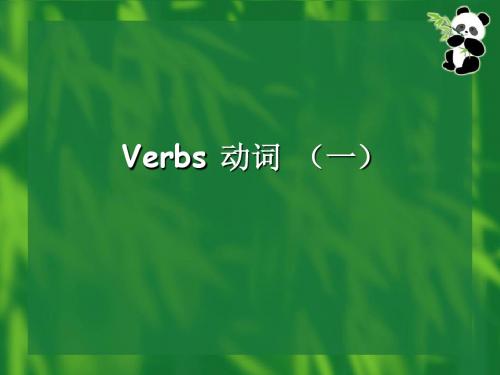
2) affect/effect Affect 是“影响”“使受到影 响”的意思。 Effect 是“产生影响”的意思。
The incident affected the relations between the two countries. The decision effected some improvement in their work.
英语中常用的连系动词有:
appear be become come fall feel get go grow keep look remain rest run smell stand sound stay taste lie etc.
实义动词根据它们的句法作用又可分为及物 动词和不及物动词两类。
50组常 用动词 的区别 (Some Common Verbs)
1) adopt/adapt Adopt 是“采纳”的意思。 Adapt 是“使适应”、“改写” 的意思
We shall adopt your methods of teaching in our school. Novels are often adapted for the stage and for radio.
1)动词+介词 其作用相当于一个及物动词。
She looks after the children during the day. The policemen are searching for the suspect.
常见的这类短语动词有:
act on (遵照) amount to (等于) call on (号召) consist of (由…组成) insist on (坚持“主张”) long for (渴望) operate on (动手术) persist in (坚持“看法”) send for (派人去请) account for (解释) attend to (照料) care for (照顾) depend on (依靠) laugh at (嘲笑) look at (看) object to (反对) rely on (依靠) stand for (代表) apply for (申请) belieh (通过) listen to (听) look into (调查) play with (玩) speak of (谈论) wait for (等待)
高中英语新人教版必修三Unit 5语法汇总(过去将来时+情态动词)
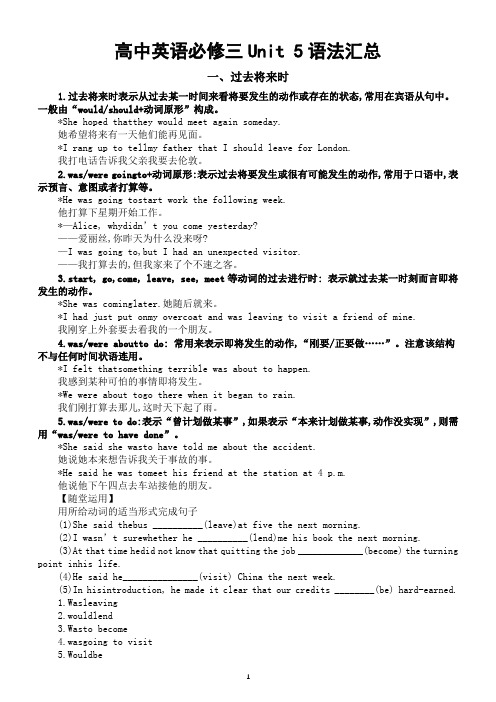
高中英语必修三Unit 5语法汇总一、过去将来时1.过去将来时表示从过去某一时间来看将要发生的动作或存在的状态,常用在宾语从句中。
一般由“would/should+动词原形”构成。
*She hoped thatthey would meet again someday.她希望将来有一天他们能再见面。
*I rang up to tellmy father that I should leave for London.我打电话告诉我父亲我要去伦敦。
2.was/were goingto+动词原形:表示过去将要发生或很有可能发生的动作,常用于口语中,表示预言、意图或者打算等。
*He was going tostart work the following week.他打算下星期开始工作。
*—Alice, whydidn’t you come yesterday?——爱丽丝,你昨天为什么没来呀?—I was going to,but I had an unexpected visitor.——我打算去的,但我家来了个不速之客。
3.start, go,come, leave, see, meet等动词的过去进行时: 表示就过去某一时刻而言即将发生的动作。
*She was cominglater.她随后就来。
*I had just put onmy overcoat and was leaving to visit a friend of mine.我刚穿上外套要去看我的一个朋友。
4.was/were aboutto do: 常用来表示即将发生的动作,“刚要/正要做……”。
注意该结构不与任何时间状语连用。
*I felt thatsomething terrible was about to happen.我感到某种可怕的事情即将发生。
*We were about togo there when it began to rain.我们刚打算去那儿,这时天下起了雨。
初中英语八年级上册(牛津译林版)Unit5Grammar优秀教学案例

一、案例背景
初中英语八年级上册(牛津译林版)Unit5涉及情态动词can的用法,这一知识点对于学生来说相对较为复杂,需要通过具体的教学案例来帮助他们理解和掌握。本案例背景设定在一所初级中学的英语课堂,教师在教学过程中发现学生在使用情态动词can时常常出现混淆和错误,因此决定设计一堂针对性的语法课,以提高学生对情态动词can用法的掌握程度。
五、案例亮点
1.情境创设法:本案例通过引入真实的生活情境,如购物、问路等,使学生能够将所学的语法知识与实际生活相结合,提高了学生的学习兴趣和参与度。情境创设不仅帮助学生更好地理解和记忆语法知识,还提高了学生的实际应用能力。
2.问题导向法:教师在教学过程中提出有意义的问题,引导学生思考和探索情态动词can的用法,激发了学生的思维能力和解决问题的能力。通过问题导向,学生能够主动思考和质疑,培养了他们的批判性思维和问题解决能力。
4.利用评价结果,教师可以对教学方法和策略进行调整和改进,以提高教学效果和学生的学习效果。
四、教学内容与过程
(一)导入新课
1.教师通过与学生进行简单的英语对话,复习已学过的一般现在时态,为导入新课做好铺垫。
2.利用图片或多媒体资源展示与情态动词can相关的情景,如一个人正在尝试跳高,引发学生对情态动词can的好奇心。
2.教师讲解情态动词can的不同形式,如can, could, be able to等,并解释其用法和区别。
3.教师进行现场演示,用情态动词can表达自己的能力和请求,让学生跟随教师一起模仿和练习。
4.教师通过多个示例句子,展示情态动词can在实际语境中的应用,如“Can I borrow your book?”等,帮助学生理解和掌握。
Unit 5 Fun clubs (语法讲练)(解析版)

Unit 5 Fun Clubs !(语法讲练)【知识讲解】情态动词can表示“能力”概述can表示能力时,意为“能;会”基本句式①肯定句:主语+can+动词原形+其他.②否定句:主语+can't+动词原形+其他.③一般疑问句:Can+主语+动词原形+其他?肯定回答:Yes,主语+can.否定回答:No,主语+can't.④特殊疑问句:特殊疑问词+can+主语+动词原形+其他?注意情态动词can不能单独作谓语,必须和动词原形连用,没有人称和数的变化I can play basketball.我会打篮球。
I can't play basketball.我不会打篮球。
-Can she dance?她会跳舞吗?-Yes,she can./No,she can't.是的,她会。
/不,她不会。
Who can play the violin?谁会拉小提琴?Jack can draw, and his sisters can swim.杰克会画画,他的姐姐们会游泳。
【拓展】(1)can还可以表示许可或请求,意为“可以”。
Can you come to my birthday party?你可以来我的生日聚会吗?(2)can还可以表示推测,意为“可能”,常用于否定句或疑问句中。
That man can't be my English teacher.那个人不可能是我的英语老师。
Can that boy be Bill?那个男孩可能是比尔吗?【同步检测】一、单项选择1.—Can you play the violin?—________, but I can sing.A.Yes, I can B.Yes, I do C.No, I can’t D.No, I don’t【答案】C【详解】句意:——你会拉小提琴吗?——不会,但我会唱歌。
考查一般疑问句的否定回答。
一般疑问句句中含有情态动词can,答语中应含有can或can’t,排除B和D;根据答语的连词but可知,此处是否定回答,故选C。
- 1、下载文档前请自行甄别文档内容的完整性,平台不提供额外的编辑、内容补充、找答案等附加服务。
- 2、"仅部分预览"的文档,不可在线预览部分如存在完整性等问题,可反馈申请退款(可完整预览的文档不适用该条件!)。
- 3、如文档侵犯您的权益,请联系客服反馈,我们会尽快为您处理(人工客服工作时间:9:00-18:30)。
Unit 5 情态动词用can, can't, may, must, have to, needn't 或mustn't 填空。
1. You ________ smoke here. It's dangerous.2. I haven't got any money with me, so I'll ________ borrow some from my friends.3. —________ I come in?—No, you ________.4. Tomorrow I ________ go shopping with you if it's fine.5. You ________ not make so much noise in the hospital.6. —________ I watch TV this evening, Mum?—Yes, you ________. But you ________ finish your exercises first.—All right. ________ I write down all the words in this lesson?—No, you ________, but you ________ write down all the new words today.You ________ write down the old ones tomorrow.7. Li Lei isn't in the classroom. He _________ be at the library.Let's go and find him.8. —Must we hand in our homework today?—No, you don't ________.要点诠释:对初学者而言,can,may,must是三个最重要的情态动词,其基本句型如下:肯定句:主语+can,may,must +动词原形.否定句:主语+can,may,must +not +动词原形~.疑问句:Can,May,Must +主语+动词原形~?一:Cana.表示能力;能,会(表能力,此时may,must都不可替代)She can run fast,but I can't.她很会跑,但是我不会。
b.表示可能;能够(表示一种可能性)I can get there in ten minutes.我十分钟之后就可以到那儿。
c.表示允许;许可(此时还可以用may代替can,但不如may正式,can常用于一般口语会话中)You can use this dictionary.你可以用这本字典。
比较can和be able tocan只有现在式和过去式,而be able to可以用于各种时态。
can(could)表示能力时,可用be able to代替。
I can(=am able to)pay for the book. 我买得起那本书。
He will be able to tell you the news soon. 他很快就能告诉你消息了。
She has been able to come to school. 她已经能去学校了。
二:Maya.表示请求、许可(比can正式)May I borrow your pen?我可以借你的钢笔用一用吗?b.可能、或许(谈论可能性、表示推测,一般用于肯定句)Tomorrow I may go shopping.明天,我可能(或许)去商店买东西。
He might be our new teacher.他或许是我们的新老师。
注意might在表示推测时,不表示时态,只是说明可能性比may还要小。
三:Musta.必须、应该(表示有做某一动作的必要或义务)You must buy a ticket.你必须买一张票。
b.一定、准是(表示有把握的判断或推测,一般只用于肯定句中,语气比may,might要肯定得多)He must be our new teacher.他肯定是我们的新老师。
在You must~.这一句型中,它的意思与祈使句相同。
You must get up early. =Get up early.你必须早起。
You must study hard. =Study hard.你必须用功读书。
比较must与have tomust侧重于个人意志和主观上的必要,have to侧重于客观上的必要。
如果用于过去时态或将来时态时,则要用have to来代替。
但must可用于间接引语中表示过去的必要或义务。
My brother was very ill,so I had to call the doctor in the middle of the night.我弟弟病得很厉害,我只得半夜里把医生请来。
(一般过去时)I haven't got any money with me,so I'll have to borrow some from my friend.我身上没有钱,只好向朋友借点了。
(一般将来时)He said that they must work hard.他说他们必须努力工作。
四:can,may,must的否定句含有情态动词can,may,must的句子,只要在它们后面加上not,就变成了否定句。
1.can的否定句can的否定式是can not,普通的写成cannot,缩字为can't。
She can't play basketball.她不会打篮球。
I couldn't swim until I was ten.我直到十岁才会游泳(十岁以前我不会游泳)。
It can't be true.那不可能是真的。
2. may(might)的否定句注意can表示怀疑或不肯定时,用于否定句和疑问句或感叹句中。
could有时只表示怀疑、推测程度,不表示时态。
He couldn't be a bad man.他不大可能是坏人。
He can't be a bad man.他不可能是坏人。
May not也表示“不可以”的意思,但单独使用时不多,大多使用于回答疑问句时。
May I come in?我可以进来吗?No,you can(may)not.(=No,you mustn't).不,你不可以进来。
3.must的否定句must的否定式是must not,缩写为mustn't,译为“不可以”、“一定不……”。
You mustn't leave so early.你们不要走得太早。
They mustn't take any book out of the room.他们不可以从房间里拿走书。
注意You must not……这一句型和否定的祈使句的意思一致。
You mustn't open this box.你不可以打开这个盒子。
=Don't open this box.请勿打开此盒。
3 can,may,must的疑问句(把can,may,must放在句首,句子就成为疑问句了)1. can的疑问句Can you play the piano?你会弹钢琴吗?Yes,I can.是的,我会。
No,I can't.不,我不会。
Can it be true?它可能是真的吗?Could he be a bad man?他可能是坏人吗?注意can表示怀疑、推测时,只用于否定句及疑问句中。
上文例句中的could不表示时态,只表示怀疑、推测的程度。
2.may的疑问句May I take this seat?我可以坐这个座位吗?Yes,you may./Sure.可以。
No,you may not.不可以。
必背!May…?的回答还可以有下列方式:Yes,of course.是的,当然可以了。
Yes,certainly.当然可以了。
Sure.当然。
No,you must not不,不行。
(具有强烈禁止的意思)No,you can't不,不行。
(口语上大多采用这一句型)3. must的疑问句Must I live here?我必须住在这里吗?Yes,you must.是的,你必须。
No,you needn't = No,you don't have to.不,不必了。
表示推测的用法can , could ,may ,might ,must皆可用来表示推测,其用法如下:a.could ,might表示推测时不表示时态,其推测的程度不如can, may。
b.can ,could 用于否定句和疑问句中。
句型:主语+ can't , couldn't +be +动词-ing~.(否定句)Can ,Could +主语+be +动词-ing~.(疑问句)They can't be cleaning the room now.他们现在不可能在打扫房间。
c.may ,might , must 用在肯定句中。
句型:主语+ may ,might ,must +be +动词-ing(表示对现在发生动作的推测)He must be sleeping . 他现在肯定在睡觉。
d.但如果上述这些词(must ,can't… ) +have+过去分词则指对过去已发生的事进行推测。
The road is wet, It must have rained last night.地是湿的;昨天晚上肯定下雨了。
There isn't any water on the road. It (can't) couldn't have rained last night.地面上一个水滴都没有,昨天不可能下雨了。
